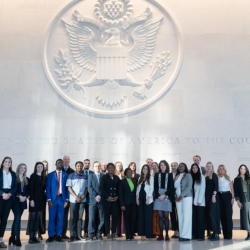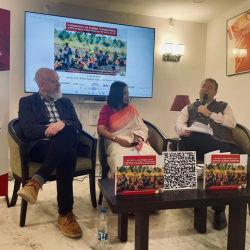In this page, you can find further details
about the PhD researchers at the Centre for Global Development,
including their thematic focus and contact details. If you are interested in commencing postgraduate
study in this area, please contact Prof Katy Jenkins or Prof Matt Baillie Smith,
co-Directors of the Centre.
 Aneeta Shajan
Aneeta Shajan
Supervisors: Prof Steve Taylor and Dr Rebecca Frilund
PhD research summary: Aneeta's PhD research looks at return migration from
Gulf economic region to Kerala, India. The research aims to conceptualise the
impact of migration on the health outcomes of migrants in the Kerala‐Gulf
corridor. The effect is analysed by examining if and how temporary
international migration has brought about accelerated health vulnerabilities
amongst migrants compared to non‐migrants from the same origin area. It does so
by navigating how migration has led to better opportunities, income, lifestyle,
and quality of life and how these factors have affected the health‐seeking
behaviours of migrants in the destination country.
Email: aneeta.shajan@northumbria.ac.uk
 Angelica Ribichini
Angelica Ribichini
Supervisors: Dr Oliver Hensengerth, Prof Matt Baillie Smith and Dr Joanna Allan
PhD
research summary: Through
an intersectional feminist lens, Angelica's research explores youth
vulnerability and adaptive capacity to climate change in the Vietnamese Mekong
Delta - a region that is widely considered to be one of the most exposed to the
impacts of climate change globally. Employing a participatory action research
(PAR) methodology, the project seeks to illuminate how intersecting markers of
power and inequality shape young people's experience of, and ability to cope
with, changing living conditions in the delta area.
Email: angelica.ribichini@northumbria.ac.uk
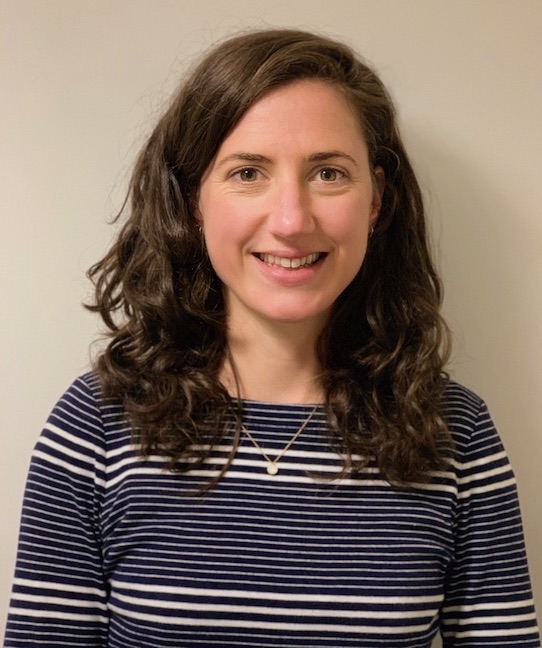 Becky Richardson
Becky Richardson
Supervisor: Prof Andrew Collins
PhD
working title: Child-centred Disaster Risk Reduction; the use
of creative methods to understand hazard scenarios and risk communication
pathways for children living in informal settlements in Nairobi, Kenya
PhD research summary: Becky’s
research seeks to critically explore child-centred health risk communication
within the field of disaster risk reduction (DRR) with children living in
informal settlements in Nairobi, Kenya. Children have the right to be
heard and listened to, as stated in the United Nations Convention on the Rights
of a Child (UNCRC, 1989) yet their voices rarely contribute to policy or
practice despite being a marginalised group. This research applies a
child-centred approach to understand children’s perceptions of hazard and risk
that impact their health and wellbeing in school and their neighbourhood. Those
risks are then explored further to see how they are communicated within the child’s
own networks and linked to local level innovative solutions to reduce risk and
improve health and wellbeing. A participatory action research (PAR) method is
applied, adopting creative and arts-based tools to enhance engagement, trust,
and equality in power relationships. Methods include deep mapping, walking
interviews, body mapping, model-making, storytelling, and drawing.
Email: rebecca.richardson@northumbria.ac.uk
 Benita Siloko
Benita Siloko
Supervisors: Dr Oliver Hensengerth and Prof Helena Farrand Carrapico
PhD working title: Human security, livelihoods and environmental degradation in the Niger
Delta Region, Nigeria
PhD
research summary: Benita’s PhD research seeks
to understand and address the complex connection between vulnerability, human
security, and livelihoods in the context of environmental degradation, in the
Niger Delta region, Nigeria. Understanding the factors that shape or
contributes to social vulnerabilities of the Niger Delta or a community is
important, as this will inform the needed entry points to increase resilience.
The environment is humans first right, without a safe environment, we cannot
exist to claim other rights – be it social, political, or economic rights.
Benita’s research further brings together the concept of environmental
security, justice and emancipation and the rights-based approach to human
security.
Email: benita.e.siloko@northumbria.ac.uk
Twitter: @BenitaSiloko
 Bina Limbu
Bina Limbu
Supervisors: Dr Katie Oven and Dr Sarah Hughes
PhD working title: Living with mountain hazards: Everyday experiences of
rural households in Nepal
PhD research summary: Owner-driven approaches to disaster risk reduction (DRR)
have been globally endorsed under the Sendai Framework 2015-2030, however, much
ambiguity exists regarding how to effectively integrate community participation
and local knowledge into DRR practices. The current literatures
contrastingly portray disaster-affected people either as ‘suffering victims’
driven to risky locations, or as the ‘drivers of their own change’ possessing
indigenous knowledge and social capital. However, in the messiness of everyday reality,
householders constantly negotiate with state and non-state bodies to rebuild
their lives and livelihoods, but do they end up any more resilient than before?
This research aims to seek answers by carrying out ethnographic study of people
living in geo-hazardous locations in Dhading district of Nepal (prone to
landslides, floods and earthquakes). In doing so, this study explores what kind
of socio-economic, political, and environmental factors interplay in their
everyday lives and how these shape their agency and decisions-making regarding
hazards.
Email: bina.limbu@northumbria.ac.uk
LinkedIn: Bina's LinkedIn Profile
Publications:
Aijazi, O.,
Amburgey, E., Limbu, B., Suji, M., Binks, J., Balaz-Munn, C., Rankin, K., &
Shneiderman, S. (2021). The Ethnography of Collaboration: Navigating Power
Relationships in Joint Research. Collaborative
Anthropologies, 13(2), 56-99. https://doi.org/10.1353/cla.2021.0003
Le Billon, P., Suji, M.,
Baniya, J., Limbu, B., Paudel, D., Rankin, K., Rawal, N., & Shneiderman, S.
(2020). Disaster Financialization:
Earthquakes, Cashflows and Shifting Household Economies in Nepal. Development and Change, 51(4), 939-969. https://doi.org/10.1111/dech.12603
Limbu, B., Baniya, J., Suji, M., & Shneiderman, S.
(2019, 19 February 2019). Reconstruction conundrums. The Kathmandu Post. https://kathmandupost.com/opinion/2019/02/19/reconstruction-conundrums
Limbu, B., Rawal, N., Suji, M., Subedi, P., &
Baniya, J. (2019). Reconstructing Nepal:
Post-Earthquake Experiences from Bhaktapur, Dhading and Sindhupalchowk. https://soscbaha.org/publication/reconstructing-nepal-post-earthquake-experiences-from-bhaktapur-dhading-and-sindhupalchowk/
Shneiderman, S., Hirslund, D., Baniya, J., Billon, P.
L., Limbu, B., Pandey, B., Rankin, K., Rawal, N., Subedi, P. C., Suji, M.,
Thapa, D., & Warner, C. (2021). Expertise, Labour, and Mobility in Nepal's
Post-Conflict, Post-Disaster Reconstruction: Law, Construction, and Finance as
Domains of Social Transformation. In M. Liechty, M. Hutt, & S. Lotter
(Eds.), Epicentre to Aftermath:
Rebuilding and Remembering in the Wake of Nepal's Earthquakes (pp. 49-86).
Cambridge University Press. https://doi.org/10.1017/9781108991636.003
Shneiderman, S. B., Limbu, B., Baniya, J., Suji,
M., Rawal, N., Subedi, P. C., & Warner, C. D. (2022). House, Household, and
Home: Revisiting Anthropological and Policy Frameworks through Post-Earthquake
Reconstruction Experiences in Nepal. Current
Anthropology.
Suji, M., Limbu, B., Rawal, N., Subedi, P. C., &
Baniya, J. (2020). Reconstructing Nepal:
Bhaktapur—Heritage and Urban Reconstruction [Working paper]. https://soscbaha.org/publication/reconstructing-nepal-bhaktapur/
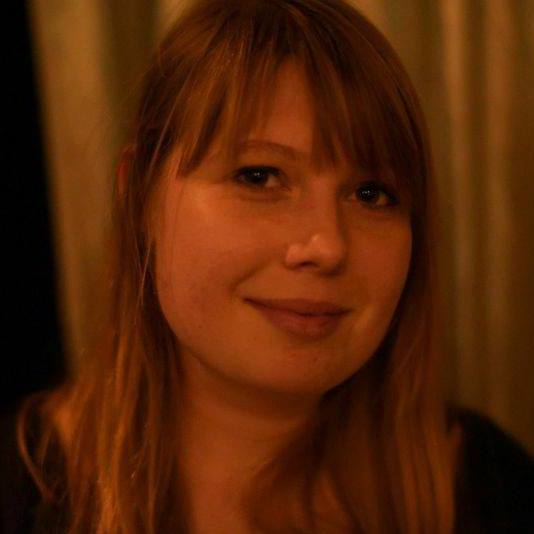 Floor van der Hout
Floor van der Hout
Supervisors: Prof Katy Jenkins
and Dr Hilary Francis
PhD working title: Women territory defenders’ activism in Bolivia: weaving resistance
against extractivism through affective, careful and relational politics
PhD
research summary: Floor’s PhD research focuses on women territory
defenders’ anti-extractive activism in Bolivia. Using a life history approach, she
explores how the defensoras weave their resistance against proposed
extractivist projects in their territories through affective, careful and
relational politics. In her research she bring feminist thought from the
‘Global North’, around embodiment, relationality and intersectionality, into
conversation with the work of anti-colonial indigenous and feminist scholars
from Abya Yala. Her ethnographic fieldwork builds on seven years of engagement
with Indigenous groups in the Bolivian Lowlands. In her work, Floor is
particularly interested in decolonial methodologies, activist scholarship,
radical pedagogies, and social justice.
Email: floor.hout@northumbria.ac.uk
Twitter: @FloorHout
Publications:
Van der Hout, F. (2022). From Colonial Extractivism to Hearting and Feelthinking, Contention, 10(1), 46-64. https://doi.org/10.3167/cont.2022.100105
Rasch, E. D., van der Hout, F., & Köhne, M. (2022). Engaged Anthropology and Scholar Activism, Contention, 10(1), 1-12. https://doi.org/10.3167/cont.2022.100102
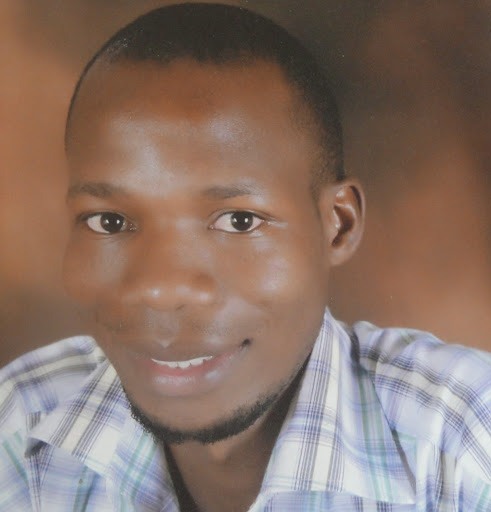 Geoffrey Bwireh
Geoffrey Bwireh
Supervisors: Dr Robert Newbery and Prof Matt Baillie Smith
PhD working title: Volunteerism,
mixed embeddedness and entrepreneurial behaviour of Congolese youth refugees in
Nakivale settlement in Uganda
PhD research summary: Geoffrey’s PhD analyses
human capital, volunteerism, social networks, and performance of youth refugees
owned micro-enterprises in Ugandan refugee settlements. Existing evidence
suggests that engaging refugees in entrepreneurial activities can support their
embeddedness within society; at the same time, volunteerism is increasingly
being celebrated as a silver bullet strategy for enhancing aid and development
in the global South. However, although the majority of the world’s refugee
population is hosted in global South countries, research into refugees
entrepreneurship has mainly focused on issues of mobility and individuals’
dual-embeddedness within host countries of the global North. This research thus
explores human capital, volunteerism and social networks through the
experiences of young refugee entrepreneurs living in Uganda refugee
settlements.
E-mail: geoffrey.bwireh@northumbria.ac.uk
Twitter: @GeffreyBwireh
LinkedIn: Geoffrey’s LinkedIn Profile
 Jos Bamborough
Jos Bamborough
Supervisor: Prof Matt Baillie Smith
PhD research summary: Joseph’s
research project explores concepts at the heart of contemporary thinking around
humanitarian response through a lens of ‘everyday’ work within international
non-governmental organisations (iNGOs). It builds on four critical (and
overlapping) bodies of literature: population displacement, humanitarian
localisation, supply chain management, and ‘geographies of the everyday’,
within the context of conflict in the Middle East, to develop an understanding
of how workers manage the flow of goods and services, funds, and information
through their supply chains.
Email: joseph.w.h.bamborough@northumbria.ac.uk
LinkedIn: Joseph's LinkedIn profile
 Lindsay Bewick
Lindsay Bewick
Supervisors: Prof Matt Baillie Smith and Prof Katy Jenkins
PhD research summary: Lindsay's PhD research seeks to critically explore the ways in which
entrepreneurial activities enable urban women refugees to create livelihoods
opportunities, focusing on three key inter-related lenses – biographies,
solidarities and space. Taking the emphasis away from current policy and
programming which has a narrow focus on how entrepreneurship leads to local
economic contributions, the broader everyday experiences and interactions of
urban women refugees will be investigated using visual and participatory
methods. The research will take place in Uganda.
Email: lindsay.s.bewick@northumbria.ac.uk
LinkedIn: Lindsay's LinkedIn profile
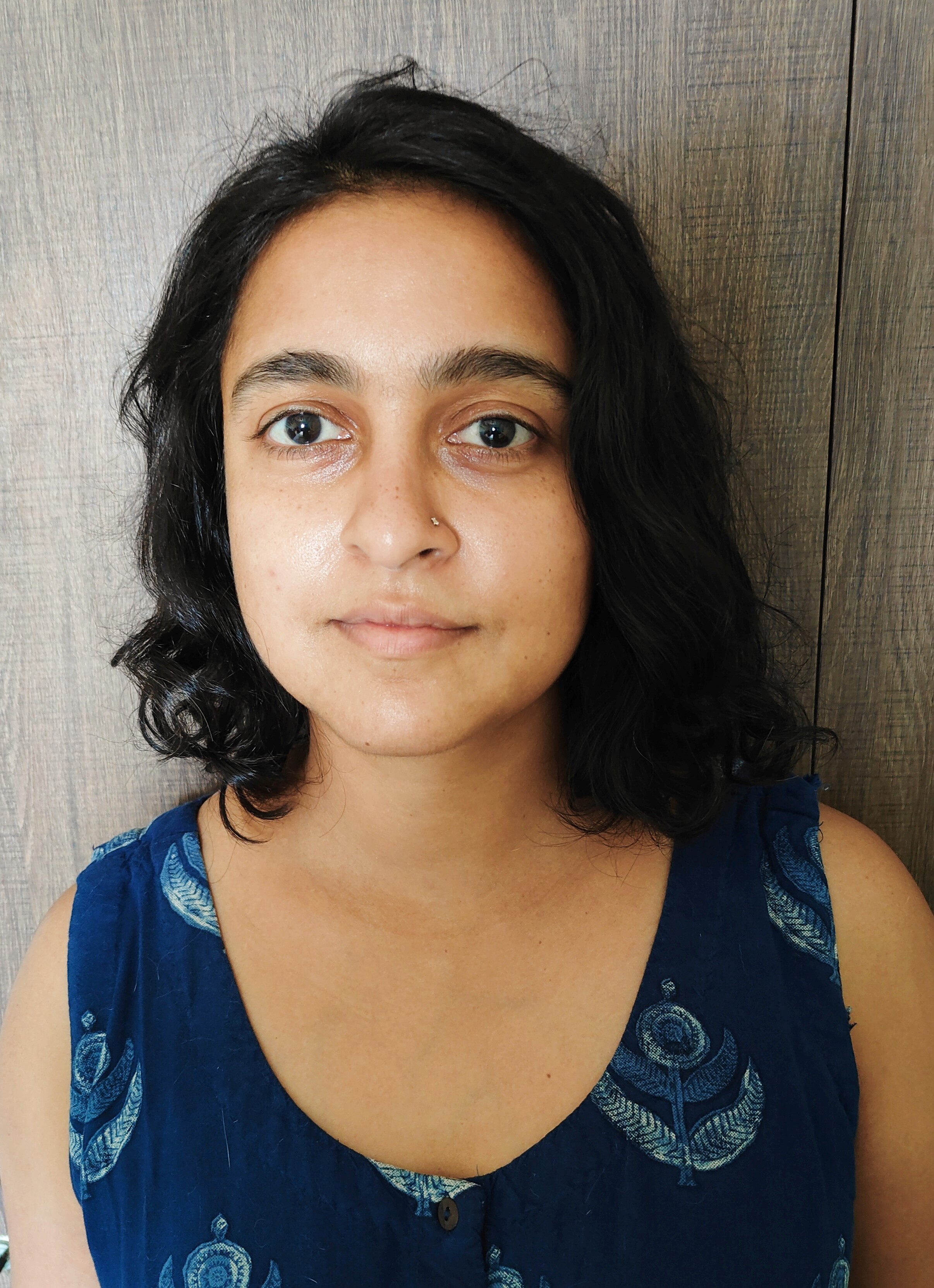 Mridula Mary Paul
Mridula Mary Paul
Supervisor: Dr Francis Masse and Prof Andrew Collins
PhD working title: The making of One Health: Cultural politics and
political ecology of the global responses to zoonoses
PhD research summary: Although zoonotic diseases have significantly
impacted already vulnerable forest-/wildlife-dependant and herder communities in developing countries, the thrust of the
global response to zoonoses is surveillance and ‘hotspot’ mapping with the
expressed goal of containing the spread “closer to their source” i.e.,
locations in the global South. The scientific research on zoonoses that inform
policies for response are therefore political endeavours as much as scientific
ones, because they implicitly confer certain spaces and groups of people with
more culpability for zoonotic disease emergence. As a dominant paradigm
addressing public health and zoonoses, One Health provides the ideal ground for
exploring the cultural politics of the science and expertise underpinning
global responses to zoonoses. The PhD project aims to merge the political
ecology of human-animal relations and the political ecology of health, thereby
contributing to the emerging field of political ecology of zoonoses and One
Health.
E-mail: mridula.paul@northumbria.ac.uk
Twitter: @MridulaMPaul
 Nikhil Panicker
Nikhil Panicker
Supervisors: Prof Steve Taylor and Dr Darryl Humble
PhD research summary: Nikhil's PhD research aims to conceptualise
inequalities between social categories in the international migration corridor
between Kerala, India and the Middle East. By understanding how regimes of
international migration are being formulated through assemblages of
infrastructures that produce different migrant categories, his project analyses who is free to move, who is forced to move, when they can or must move, how
they ought to move, and who cannot move.
Email: nikhil.panicker@northumbria.ac.uk
LinkedIn: Nikhil's LinkedIn profile
 Robert Bowden
Robert Bowden
Supervisor: Prof Matt Baillie Smith
PhD research summary: Robert's PhD project is a collaborative research in partnership with the international NGO Christian Aid, focused on the dynamics of
‘transformational’ supporter engagement and global citizenship in relation to
Christian Aid’s work in the UK.
Email: rob.c.bowden@northumbria.ac.uk
 Robert Olet
Egwea
Robert Olet
Egwea
Supervisors: Prof Matt Baillie Smith and Dr Francis Masse
PhD working title: The impact of tree
protection strategies on rural livelihoods in the shea tree belt of Uganda
PhD research summary: Robert’s PhD research investigates the impact of tree protection strategies on livelihoods in Uganda's shea tree belt, a vital ecosystem supporting the livelihoods of millions of people in a region that has experienced significant deforestation in recent years, leading to soil erosion, loss of biodiversity, reduced water quality, poverty, and food insecurity. The study will contribute to knowledge on deforestation, climate change mitigation, and livelihood outcomes in the global South by providing insights into the complex interrelationships between various tree protection strategies, challenges, and livelihoods in the shea tree belt. The original contribution to knowledge in this study lies in the synthesis of the concepts of agency, theory of access and sustainable livelihoods approach to understand these relationships. While previous studies have explored the environmental benefits of tree protection strategies, this study highlights the crucial role of the strategies in supporting the livelihoods of rural communities in the global south, particularly in the shea tree belt.
Email: robert.egwea@northumbria.ac.uk
LinkedIn: Robert's LinkedIn Profile
 Ruth
Stevenson
Ruth
Stevenson
Supervisors: Prof Steve Taylor and Prof Katy Jenkins
Summary: Ruth's PhD research seeks to critically explore the relationship between international
migration and women’s development within Kerala, India, where overseas migrants
provide 40% of state income. The international migration process in India is
still largely male dominated, and dominant discourses celebrate the positive
relationship between migration and Indian development. This research will make
a distinctive contribution to an emerging body of literature focusing on
migration and inclusive development by focusing on Keralan women ‘left behind’,
the challenges they face, and the longer term impacts on women in the Keralan
model of development which has seen vast improvements in health outcomes and
literacy rates in Kerala.
Email: ruth.stevenson@northumbria.ac.uk
 Sichelesile N. Maxine Mpofu
Sichelesile N. Maxine Mpofu
Supervisors: Prof Matt Baillie Smith and Dr Reem Talhouk
PhD working title: A Critical Analysis of How Young People with Disabilities Shape the Development of Rural Zimbabwe
PhD research summary: Maxine is interested in Youth
Geographies, with a particular focus on the elasticity of young personhood and
the nuanced experience of global development. The current research project
employs Participatory Research approaches to collaborate with diverse young
people with disabilities in interrogating the nature of Participatory
Development in rural Zimbabwe. The project seeks to contribute to studies
filling the dearth of Development Geographies literature that captures
decolonised youth narratives, by the youth and for the youth in the global
South.
Email: maxine.mpofu@northumbria.ac.uk
Twitter: @maxine_mpofu
LinkedIn: Maxine's LinkedIn Profile
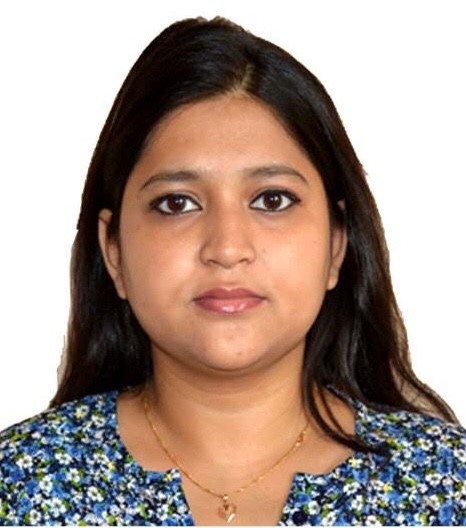 Shamima Akter Shanu
Shamima Akter Shanu
Supervisors: Prof Matt Baillie Smith and Dr Katie Oven
PhD working title: Voluntary Labour in the Climate Emergency: Exploring the Experiences of Youth Volunteers in the Context of Climate-Vulnerable Bengal Delta
PhD research summary: Shamima’s PhD research
explores the roles of youth volunteers in climate emergency at the Bengal delta
in South Asia. This delta is repeatedly affected by disasters and ongoing
climate impacts. Despite inclusion in diverse policy objectives and ambitions, young
volunteers’ lived experiences, voices and practices are absent from popular,
scholarly and policy thinking. Therefore, this research aims to explore the
everyday life experiences of those marginal youth volunteers amongst climate
vulnerable communities in Bangladesh. This research adopts participatory research
approaches to collaborate with diverse stakeholders in the coastal communities in
order to generate new knowledge that will contribute to both volunteer and
climate change domains separately and combinedly. Shamima’s overall research
interests are related to climate change adaptation, disasters risk reduction, water
and sanitation, mangrove ecosystem and deltaic ecosystem.
Email: s.shanu@northumbria.ac.uk
Twitter: @ShamimaShanu
LinkedIn: Shamima’s LinkedIn profile
 Sophia Valle-Cornibert
Sophia Valle-Cornibert
Supervisor: Prof Katy Jenkins
PhD research summary: Sophia is a feminist social
anthropologist from Chile. Her research seeks to critically explore women’s
social and political mobilisation and its articulation with the gendered
impacts of large-scale mining, in the Atacama Desert, in the north of Chile.
With a focus on feminist decolonial perspectives, her research navigates
through participatory and visual ethnographic (filmmaking) methodologies, with
the intention of exploring through more collaborative and collective processes
for the creation and dissemination of knowledge.
Email: sophia.valle-cornibert@northumbria.ac.uk
Twitter: @CornibertSophia
 Tzu Jung Feng (Emily)
Tzu Jung Feng (Emily)
Supervisor: Prof Katy Jenkins
PhD research summary: Tzu Jung (Emily) is interested in everyday resilience and the geography of medical voluntourism, with a particular focus on health professional identity and their voluntary experiences in the development of community well-being in the global South. Through feminist participatory research and visual ethnographic methodologies, her current research project seeks to contribute to studies of gender inequality in the medical profession, both among health professionals and within their households.
Email: tzu-jung.feng@northumbria.ac.uk


 Aneeta Shajan
Aneeta Shajan Angelica Ribichini
Angelica Ribichini Becky Richardson
Becky Richardson Benita Siloko
Benita Siloko  Bina Limbu
Bina Limbu Floor van der Hout
Floor van der Hout Geoffrey Bwireh
Geoffrey Bwireh Jos Bamborough
Jos Bamborough Lindsay Bewick
Lindsay Bewick Mridula Mary Paul
Mridula Mary Paul Nikhil Panicker
Nikhil Panicker Robert Bowden
Robert Bowden Robert Olet
Egwea
Robert Olet
Egwea Ruth
Stevenson
Ruth
Stevenson Sichelesile N. Maxine Mpofu
Sichelesile N. Maxine Mpofu Shamima Akter Shanu
Shamima Akter Shanu Sophia Valle-Cornibert
Sophia Valle-Cornibert
 Tzu Jung Feng (Emily)
Tzu Jung Feng (Emily)




